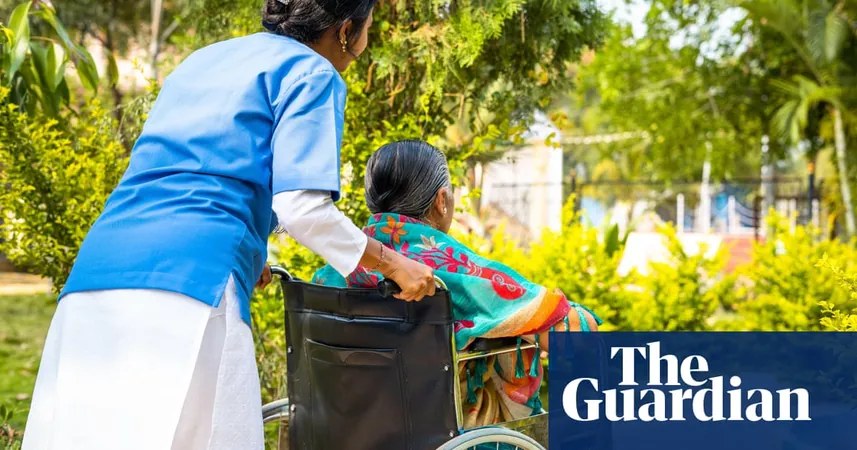
Revolutionary Drugs Signal a 'New Era' in the Fight Against Dementia, Experts Predict
2025-01-08
Author: Wei Ling
Exciting advancements in medicine are paving the way for a groundbreaking shift in the battle against dementia, particularly Alzheimer's disease. Experts are optimistic that new drugs on the horizon could soon prevent the onset of this debilitating condition or significantly mitigate its effects.
Globally, approximately 50 million individuals currently live with dementia, with more than two-thirds residing in low- and middle-income nations. Recognizing the need for accessible healthcare, Jeff Cummings, a notable professor of brain science at the University of Nevada, states, “We are on the brink of an era where care for dementia can be democratized, thanks to ongoing scientific advances.”
In 2024, the healthcare landscape witnessed the introduction of two major Alzheimer’s drugs: lecanemab from Eisai and Biogen, and donanemab from Eli Lilly, both of which have received approval from regulatory authorities in countries such as the US and the UK. Cummings expressed his enthusiasm for the new developments, stating, “We have opened the door to understanding and manipulating the biology of Alzheimer’s for the benefit of patients.”
However, this optimism is tempered by significant challenges. With annual treatment costs estimated between £20,000 to £25,000 per patient, these newly approved drugs are currently inaccessible through the NHS, primarily due to their high price tag. Additionally, complex administration procedures, including the need for advanced monitoring technologies, pose restrictions on widespread availability.
Nevertheless, Cummings emphasized that these innovations provide critical insights for targeting dementia, with the potential for future therapies that could be made available in various healthcare settings worldwide. Notably, there are currently 127 drugs in various stages of trials aimed at combating Alzheimer’s.
Both lecanemab and donanemab work by promoting the body's removal of amyloid plaques in the brain and have been shown to help slow cognitive decline by approximately 30%. However, patients must first undergo sophisticated diagnostics, including PET scans or lumbar punctures, and ongoing treatment necessitates frequent brain scans. Such advanced medical resources are often scarce in many parts of the world, making treatment especially challenging.
One promising development is the US Food and Drug Administration's recent decision to allow Alzheimer's diagnosis based on blood tests that detect 'biomarkers' associated with the disease. Such a shift could make diagnostics more accessible and reduce reliance on costly imaging technologies.
Moreover, recent trial results indicate that administering these new drugs via subcutaneous injections may soon be possible, allowing for at-home treatment by healthcare providers or family members. Cummings optimistically noted, “Ultimately, we want oral medications—simple pills to be taken once a day.”
Excitingly, tablet formulations of semaglutide, widely known as Ozempic, are currently in trials for Alzheimer’s, with results anticipated in late 2025. Cummings, leading these studies, points to the drug's potential to reduce inflammation, a critical factor in the progression of Alzheimer's.
Cummings advocates for greater participation from low- and middle-income countries in clinical trials to enhance understanding of dementia treatments across diverse populations.
As for the possibility of finding a cure for Alzheimer’s, Cummings believes it remains a difficult challenge but is not insurmountable. “We understand enough about the biological processes involved that, potentially within our lifetimes, we could control the mechanisms that initiate the disease,” he remarked.
Furthermore, experts have identified that up to 40% of Alzheimer’s cases may be preventable through lifestyle changes targeting key risk factors, including smoking cessation, reduced alcohol consumption, and better air quality.
However, lowering prices and altering perceptions of dementia care in developing countries will be crucial for making these transformative drugs more accessible. Paola Barbarino, CEO of Alzheimer’s Disease International, emphasized that many health ministries in lower-income nations mistakenly believe that dementia does not affect their populations, underlining the urgent need for awareness and education in these regions.
The tide is turning in the fight against dementia, with promising new therapies and greater global awareness set to change the landscape of care forever. Stay tuned for more updates in this crucial battle against a condition that affects millions around the world!
 Brasil (PT)
Brasil (PT)
 Canada (EN)
Canada (EN)
 Chile (ES)
Chile (ES)
 Česko (CS)
Česko (CS)
 대한민국 (KO)
대한민국 (KO)
 España (ES)
España (ES)
 France (FR)
France (FR)
 Hong Kong (EN)
Hong Kong (EN)
 Italia (IT)
Italia (IT)
 日本 (JA)
日本 (JA)
 Magyarország (HU)
Magyarország (HU)
 Norge (NO)
Norge (NO)
 Polska (PL)
Polska (PL)
 Schweiz (DE)
Schweiz (DE)
 Singapore (EN)
Singapore (EN)
 Sverige (SV)
Sverige (SV)
 Suomi (FI)
Suomi (FI)
 Türkiye (TR)
Türkiye (TR)
 الإمارات العربية المتحدة (AR)
الإمارات العربية المتحدة (AR)